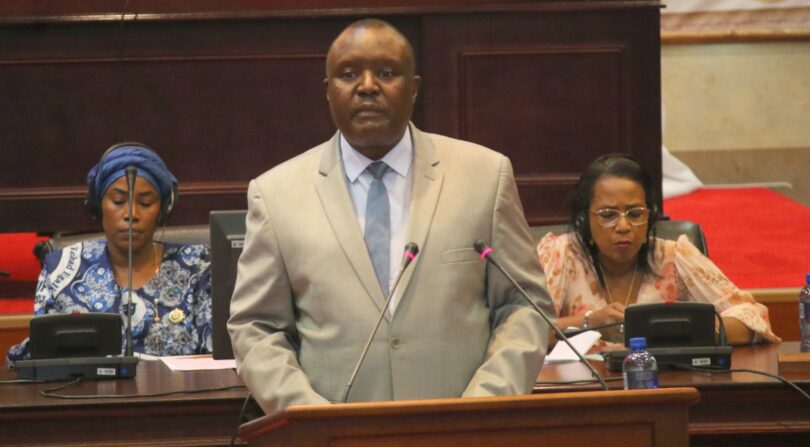|
Getting your Trinity Audio player ready…
|
On International Women’s Day today, Hon Senator Chief Fortune Z. Charumbira underscored the fact that women’s rights are human rights in his address to parliamentarians and dignitaries at the continental legislative body’s headquarters in Midrand, South Africa.
Among the dignitaries attending the celebrations at the PAP are representatives of the United Nations, the Bureau of the Pan African Parliament; a representative of the President of the PAP Women’s Caucus, Hon. Amina Tidjani Yaya; the PAP Chairperson of the Committee on Gender, Family, Youth, and People with Disabilities, Hon Dao Gabala Mariam; Members of Parliament; the Dean of African Diplomatic Corps in the Republic of South Africa, His Excellency, Ambassador Andre Nzapayeke; esteemed Members of the Diplomatic Corps; the Acting Clerk of the Pan African Parliament, Mr. Gali Massa Harou; Development Partners: UNAIDS, UNESCO, UNWOMEN, WFP, UNFPA; esteemed resource persons; and members of the media fraternity.
International Women’s Day (IWD) is celebrated annually across the globe on the 8th of March as a focal point in the women’s rights movement, bringing attention to the progress made on gender equality in all its manifestations, including, reproductive rights, gender-based violence, abuse against women and economic rights, among others.
“While this is a day to celebrate achievements and progress, it is also a day for all of us to take stock of what must still be done to achieve equal rights and equal opportunities for women. I must admit that the theme for this year “For An Inclusive Digital World: Innovation and Technologies for Gender Equality,” refocuses our attention on one of the critical areas in which women are sorely underrepresented. In our quest for accelerated economic development, especially in the wake of the debilitating effects of the COVID-19 pandemic, the majority of our Member States have adopted Science, Technology, Engineering and Mathematics (STEM), as a catalytic driving factor in post-COVID economic recovery. Sadly, one of the major criticisms of STEM has to do with the gender disparity in students who graduate with STEM degrees and enter careers related to these fields.
“Research has shown that women are far less likely to graduate with a STEM degree or enter a career in STEM compared to their male counterparts. African women are even less likely to find the encouragement they need to pursue STEM careers as a result of a patriarchal system that believes the woman’s place is in the home. Research conducted by Maryville University in the United States revealed that the gender gap is especially pronounced in the computer sciences with only 19% of computer science degrees awarded to women in 2020. The statistics do not get any better for women in computer science careers, with only 20% of computer scientists in 2019 being women,” Chief Charumbira said.
As the continental legislature, PAP continues to play its part to advocate for the ratification, domestication, and implementation of African Union Protocols on women’s rights. Additionally, since its inception, PAP has embarked on deliberate programs earmarked to protect women’s rights and enhance gender equality and affirmative action for women across Africa.
The PAP has created space for an Annual Women’s Conference at every October Plenary Session, through which it is able to harness the enormous potential for constructive engagement of African women to Africa’s development agenda.
Cognizant of the impact of conflict on women and children, the PAP has also undertaken fact-finding missions to assess the situation of women and girls in conflict areas including Chad (May 2006); Central African Republic (April 2007); Burkina Faso (2008); Saharawi Arab Democratic Republic (July 2011) and Sudan and South Sudan (September 2012). In order to increase awareness and eradicate harmful traditional practices such as female genital mutilation/ cutting (FGM/C), the PAP undertook fact-finding missions to various member states including Ethiopia in 2009. It also contributed to the launch of a pilot training programme for African midwives in Sudan in 2012, towards strengthening health systems, particularly in the provision of maternal health services in Africa.
